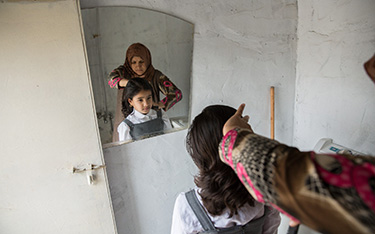Cash assistance helps Syrian children in Iraq catch up on education
2016-06-27
© UNICEF Iraq/2016/Anmar
By Chris NilesIsra and her family have been displaced twice – first from their home in Damascus, then from the Syrian town of Hasakah. Now settled in a village on the outskirts of Erbil in Iraq’s Kurdistan region, she is restarting her education at a local school, with the help of a UNICEF-supported cash grant programme.
ERBIL, Iraq/HONG KONG, 27 June 2016 – “Isra had missed out on a year of her education by the time she arrived here,” says Sirwan, deputy principal of Tarin School. “But she’s a very good student. It’s good that she’s back in class.”
Isra, 8, is in the third grade. She lives with her mother, older sister and two others.
Originally from Damascus, the family has been displaced twice, first to the Syrian town of Hasakah and then to the Kurdistan region of Iraq where they now live in a village on the outskirts of Erbil. The locals in their new community have gone out of their way to help make them feel welcome.
“There are many Syrian families in serious situations,” Sirwan says. “We don’t let them feel like strangers. We work together to help them.”

© UNICEF Iraq/2016/Anmar Isra’s mother helps her get ready for school in the morning. The cash transfers she and her sister receive allow them to buy clothes and supplies for school.
Isra is shy, with a ight smile and a generous spirit that makes her popular with her classmates. After her mother gets her ready, dressing her in a neat grey pinafore, then ushing her hair and pulling it back into a ponytail, her friends come to her house and they walk together to school. It takes about ten minutes and they chat and laugh, pausing only at the corner store to buy snacks for the afternoon.
When Isra arrives at school and sees that the one of her friends is sweeping the classroom, she takes the oom and helps finish the job. The students mill around until the teacher arrives, then they run to their seats and open their textbooks to begin their exercises.
With generous funding from the United States, UNICEF supports students like Isra and her sister through a cash transfer programme, along with support to the schools. Both girls receive US$30 per month to help cover costs of their education.
UNICEF is allocating $US2.6 million to 11,300 displaced and refugee children in the Kurdistan region to reduce the economic barriers to attending both school and summer school in the next two years.
“I’m so happy to get this money,” Isra said after receiving the first payment, “We will use it to buy clothes and shoes for school.”

© UNICEF Iraq/2016/Anmar Isra’s mother says goodbye as she and her sister leave their home to walk to school. After leaving their Syrian home and losing their father, school represents a small patch of normalcy for the family.
UNICEF’s cash transfer programme uses the innovative digital system, Last Mile Mobile Solutions, which minimizes paperwork and is designed for maximum efficiency and accountability. Families simply receive an identity card, which they take with them to a distribution site and pick up their cash.
“This type of programme is a very good complement to UNICEF activities. Sometimes families can’t send their children to school because they don’t have enough money for the transport or other basic costs associated with it,” says UNICEF Technical Specialist Giuseppe Simeon.
With the monthly stipend putting her back in class, Isra has caught up quickly. “You wouldn’t know that she lost so much time,” Sirwan says. “This is a big school and it’s overcrowded, but we’ve all supported her to catch up on her learning.”
School represents a small patch of normalcy for the family, which Isra’s mother Kafya has headed alone since her husband died five years ago.
“Thanks to God we have enough to eat, but we don’t have enough income for much else,” Kafya says. “We miss Damascus, and our family and our old life, but the most important thing here is that my children are safe and back in school.”









